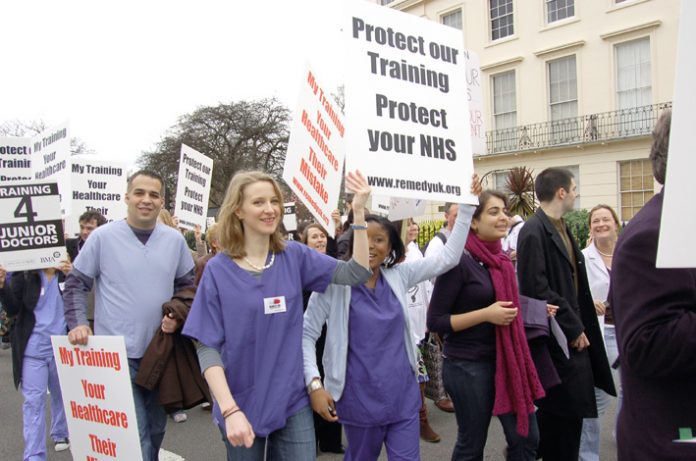
The British Medical Association (BMA) yesterday repeated its concerns that the government is out to privatise GP surgeries.
A spokeswoman told News Line: ‘The BMA is very concerned that plans outlined by Lord Darzi may turn out to be a way of introducing further private sector providers into the NHS.
‘We would be against private, commercial providers being invited to tender for these new GP centres in a way that disadvantages traditional GPs.’
The BMA had announced earlier this month that it has written to Darzi over plans for 100 new GP surgeries and 150 polyclinics.
However the government’s response has been to announce it is proceeding with its plans and issuing ‘guidance’ to primary care trusts to expand surgeries using new Alternative Providers of Medical Services (APMS) contracts.
BMA GPs committee Deputy Chairman Dr Richard Vautrey warned this will mean that many existing GPs will not be able to bid to extend their current surgeries as they are operating on a different contract.
He said: ‘Instead, they will have to put forward plans for completely new practices. That seems unfair and basically this is a way to get the private sector into the profession.’
The BMA GPs Committee warned on December 12 that ‘government plans to introduce a new type of GP practice involving the commercial sector could leave patients in deprived areas with a second class service.’
In a letter to Lord Darzi, Dr Laurence Buckman, chairman of the GPs Committee (GPC) said: ‘We believe that patients registering with practices run by private organisations holding APMS contracts (Alternative Providers of Medical Services) would be at a distinct disadvantage compared to those registered with a “traditional” general practice, exacerbating rather than alleviating health inequalities.’
The BMA letter pointed out: ‘It is clear that in fact PCTs (Primary Care Trusts) will only be able to use APMS.’
The letter warned that private organisations holding APMS contracts employ a salaried or locum staffing model akin to that of practices run directly by a PCT where the turnover of employed doctors is often high, running costs are higher than traditional models of general practice and quality scores are lower.
On December 18, the Department of Health announced ‘a £132 million wave of new NHS community hospitals and super-surgeries.’